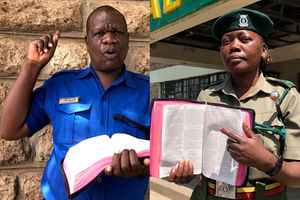
Traffic police officers at a road block along the Nakuru-Nairobi highway in this picture taken on May 14, 2024.
It used to be that once a police officer in uniform flagged down a matatu, the driver or conductor would quickly slip a crumpled Sh50 note into their hand.
When noise about corruption on the roads became louder, the money would be hidden in a driving licence, or clandestinely dropped on the ground as the matatu sped off.
But with mobile phones and security cameras watching almost everything, all the time, the cat and mouse game keeping the corruption ring running has evolved, as its participants demonstrating that money must change hands on Kenyan roads.
The keen eye will notice police officers or county enforcement personnel hop into the passenger seat of matatus once they get into the Nairobi city centre, have a short chat with the driver and then alight, seemingly empty handed.
In some cases, the short chat entails the officer dictating to the driver an M-Pesa agent’s details, so as to withdraw what used to be a crumpled note.
“They find it good to share the M-Pesa agents, till and store numbers where the fee is sent by the matatu crew to avoid EACC officers and undercover journalists who might be trailing them,” a Forward Traveller’s Sacco crew said in an interview.
“This (withdrawing from an M-Pesa agent or receiving a lump sum from saccos) is the new method they use after they refrained from taking money from matatus with passengers for fear of being recorded after technology advanced,” a South B Matatu Sacco conductor remembers.
While the law views this a bribe, police officers see it as protection fees, and the matatu industry players as a licence to operate with little regard for rules or order.
In some cases, a police officer will dictate to the driver his phone number and other details, so that the sacco under which the vehicle operates can remit money.
This illicit business peaks between 6 am and 11 am in the Nairobi city centre.
Recently, it has become a cutthroat business as police have to compete with Nairobi County enforcement officers tasked with unclogging traffic in the city centre during rush hours.
A month-long investigation by the Nation indicates that along Landhies road, Kenyatta avenue, Central Bus Station, Railways and the Koja roundabout, it is just a question of whether a police officer or county staffer will get into the matatu first.
There is only one constant for the matatu operators – they have to pay.
At times the fee is between Sh100 and Sh500 varying with the matatu sitting capacity and at times a higher amount if the driver or vehicle is in violation of traffic laws.
Police spokesperson Dr Resila Onyango admitted that there are some officers running an extortion ring targeting the matatu industry, but held that anyone caught will have to face the same law they promised to uphold.
“Yes, there have been complaints on rogue officers but in Kenya we do not have a registered training college for training police officers on fraud. Each officer will carry his or her own cross if charged with fraud and the courts find them guilty,” Dr Onyango spoke.
Dr Onyango emphasized that Inspector-General Douglas Kanja is clear on corrupt officers, maintaining that some have already been suspended or expelled from the service. Others, she added, have been transferred.
Police officers in the extortion ring waylay matatus at strategic points.
Matatu crew who spoke to us said the officers sometimes board a matatu at roundabouts, or when the driver is waiting for traffic lights to turn green.
“Each officer or Marshal must be quick enough to have a catch since they have daily targets to make. A 14 seater Nissan matatu parts with between Sh100 and Sh200 before it enters the CBD,” a matatu driver remarked.
“You give them the cash lest your vehicle will not be allowed to pick up passengers or ply the respective route. They are not different from mungiki members. Sometimes they write down the vehicle number plates on a piece of paper to enable them know who have paid and who has not,” an Enabled Sacco driver said.
Another sacco official added that recently, police officers have enlisted the services of young men and women to collect bribes on their behalf.
Those enlisted pose as sacco officials. They stop at stages designated to specific saccos, and then pick the loot and deliver it to the police officers.
Under the cover of darkness, another extortion ring starts its shift, targeting bars and nightclubs.
Police officers move from one establishment to the next, collecting what they term as protection fees.
Some use vehicles designated for patrol, others use personal cars. A few do the rounds on foot.
“The movement is usually between 7.00 pm and 10.00 when entertainment joints are open. The fee ranges from Sh100 to Sh500. In illegal structures especially in the informal settlements where traditional brew is sold ranging from Busaa, Miti ni Dawa, Muratina and Toivo among others, the fee is normally between Sh50 and Sh100. However, the fee is higher if it is to be received by a high-ranking officer say for instance a rank of a Senior sergeant upwards,” our source privy confidently spoke.
Makadara police boss, Judith Nyongesa admitted that some police officers are in such extortion rings, but insisted that in her station, official vehicles are not used for illegal activities.
Ms Nyongesa held that upon promotion to sub-county police commander, she warned officers against using official police vehicles for extortion of business owners and that any officer found afoul of the law would carry their own cross.
“I do not send any junior officer to collect money from bars. It is absolutely their agreement between the traders and my officers but not a single incident has been reported in our OB. To me, those are hearsays and allegations. If anyone is offended launch the complaint to me,” She says.
On most Friday nights along the busy Outering road, at the Umoja-Kariobangi intersection, police officers mount a roadblock, which has turned into a money collection point targeting drunk drivers.
The legal status of the breathalyser devices used by the officers is in limbo, as the Court of Appeal in 2017 held that rules introducing their use were inconsistent with the Traffic Act.
Rather than deter drunk driving at the roadblocks, the police officers collect bribes and let perpetrators continue with their risky journies.
“If you are a victim, one has to part with between Sh10,000 and Sh20,000 for being drunk,” our source responded.
Separately, at Sabasaba Trading Centre along Murang’a road traffic officers usually mount an illegal road block as they barricade the road using spikes.
Bribery instigated by police officers has been the bane of government for decades. Successive Presidents have pledged to rid the country of the menace by improving the welfare of police officers.
A report by a task force headed by former Chief Justice David Maraga recently revealed that senior police officers are part of the extortion ring.
The task force found that money collected by junior officers from motorists is shared up the command chain.
The Maraga-led team seemed to take a jab at the tradition of transfers after corruption rings were exposed, as it faulted the National Police Service for failing to fire officers found collecting bribes.
“It is also significant that despite the reported cases of corruption in this (traffic) unit, not a single officer has been dismissed from the Service for engaging in bribery on the roads. This very fact points to leadership failure or possible complicity of the NPS leadership in this vice,” the report reads in part.
Asked about her take on the implementation of the retired Chief Justice David Maraga’s report, Dr Onyango reiterated that it will take time to fully implement it but as of now, “we are implementing some of the issues pointed out in the report”.
The task force recommended a restructuring, with no officer who has served in the traffic unit, present or past, returning to the new team.











